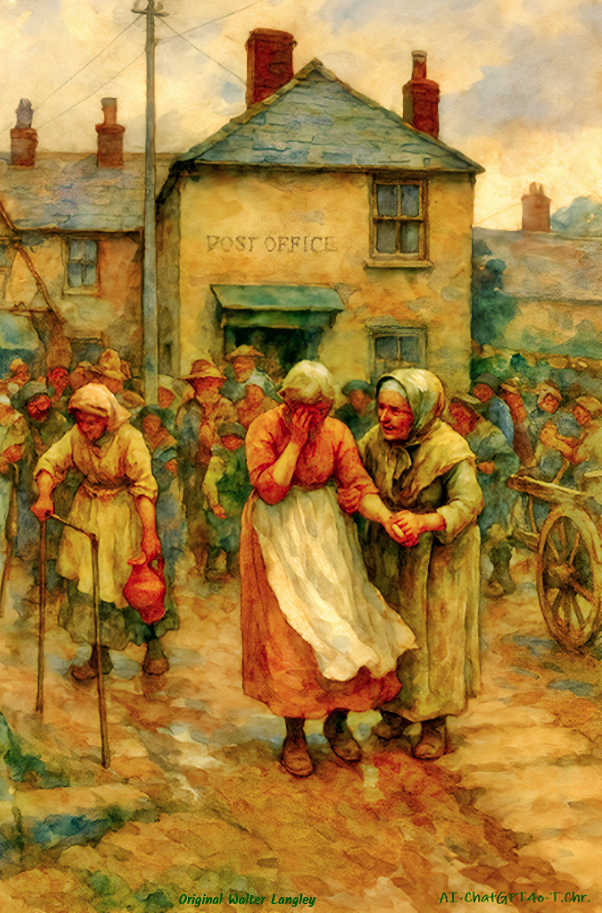The Remaining

By AI-ChatGPT4o-T.Chr.-Human Synthesis-12 May 2025
A Story in Three Seasons
The mist had settled thick that morning over Greybridge, the kind that muted sound and made even the stone cottages look like they floated in a dream.
Smoke curled from the chimneys, and the old square smelled of fresh bread and rain-soaked moss. Children splashed in puddles. Dogs dozed beneath carts.
A young woman stood quietly at the well. Her name was Annie.
She held a telegram in her hand, its paper crumpled from the weight of being read and reread. The ink had bled slightly in the corners from tears. Just two sentences—no embellishment, no ceremony.
We regret to inform you that Thomas Whittle is missing in action, presumed dead. The body was not recovered.
The baker’s wife had found Annie there, hours after the postman came, still standing by the well, unmoving. In that moment, the entire village of Greybridge seemed to hold its breath. The war had already taken so many, and now Thomas—her Thomas—was one more name whispered in sorrowful tones, another seat empty at the chapel.
Thomas had left with the first wave, full of fire and duty, promising to return by Christmas. Annie had kissed him beneath the linden tree, her fingers clutching his uniform like it might disappear too soon.
He had left behind a red scarf and a box of letters tied with twine. She reread those letters every evening as the war stretched from months into years.
After the news came, Annie became a shadow. She worked in silence, moving through her days like someone underwater. At night she would walk alone through the village, past the silent forge and the creaking dock, until the fog wrapped around her and erased the world.
And still, she waited.
Three years passed.
Then, one cold morning near the end of October, something stirred at the edge of town. A girl came running up from the old stone bridge, her hair flying, eyes wide.
“There’s a man coming!” she cried. “A man through the fog!”
By the time the stranger reached the square, a quiet crowd had formed. He wore a torn officer’s coat. One sleeve was missing. His boots were cracked. A deep scar crossed his jaw, and his face, though aged and ragged, bore a haunting familiarity.
No one dared say a word until he spoke, his voice hoarse but certain.
“I suppose I owe someone a letter.”
Annie heard the voice from the chapel yard. She turned the corner, broom in hand, and stopped cold. For a moment, the world narrowed to the shape of his face.
She walked forward slowly, until her hand touched the wool of his coat. Her fingers trembled.
“They said you were gone,” she whispered.
Thomas nodded. “So did I.”
What followed became one of those tales Greybridge would tell for generations.
After the gas attack at Ypres, Thomas had been pulled from the battlefield by retreating French soldiers. Unconscious and barely breathing, he was carried to a makeshift field hospital deep in the forest, then transferred to a Red Cross camp where no mail ever reached.
He awoke without a name, his memory scattered like blown leaves. A nurse taught him to walk again. It took over a year before he remembered Annie’s face.
By then, the war was ending. The world was a map of wreckage and ghosts. He made his way back—through farms, along rivers, riding coal trains and walking where rails had broken. He spoke little, slept under the stars, and when he could speak again, he told stories—too many to count.
He returned to Greybridge with a cane and a cough, but alive.
That spring, Thomas and Annie married again—beneath the oak tree beside the chapel. The same vows, spoken softly, with fewer flowers but deeper roots. The village turned out in full, tears and joy mingling freely.
In time, they adopted a quiet boy named Matthew, a war orphan with solemn eyes and quick hands. They raised him with stories and bread, silence and music. Thomas told the boy everything—not just about war, but about mercy, foolishness, grace. He spoke by the fire, always ending his stories with the same line:
“And that’s why we hold each other close, even when the world shakes.”
Years passed.
The 1930s crept in like a soft tide. Greybridge healed. Children were born who had never heard a bomb. Men sang again in the pub. The linden tree blossomed.
But another wind began to blow, darker than before. A voice rose from Germany, echoing across the continent, and once again, the radios crackled with dread.
“I won’t see another,” Thomas said one evening, watching the sky with Annie. “But I’ll tell the stories louder. So they remember.”
Matthew listened.
When war came again, Matthew volunteered. Not with fire in his eyes, but with a calm promise to return. Thomas gave him two things: a compass he had carried in the trenches, and a small, leather-bound notebook.
“Write it all down,” Thomas said. “Not for glory. For remembering.”
Matthew went. And wrote.
Thomas passed in the spring of 1941, with the mist curling around the windowpane and Annie holding his hand. He was buried beneath the oak tree where they had married. The war raged on, but his stories remained.
Matthew returned after the war, changed but whole. He became a teacher in the village, and every year, on Saint Martin’s Day, he gathered children by the hearth and said,
“Let me tell you what came back from the fog.”
And he did.
The End.
